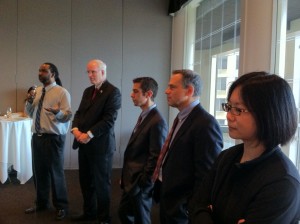March 29th, 2012
Final Note from ACC: Insights on Board (Re)Certification
John Ryan, MD
On Sunday night, CardioExchange hosted a discussion of the ABIM board certification process. Some 40 fellows and several practitioners and academics from around the country gathered at Spiaggia on Michigan Avenue in Chicago to socialize, enjoy good food and hear from a panel of ABIM board members and recent board passers.

Pictured from left: Kyle McIver, Drs. John Gordon Harold, Benjamin Freed, Harlan Krumholz, and Susan Cheng
The View from the Stands: Drs. John Gordon Harold (President-Elect, American College of Cardiology) and Harlan Krumholz (Editor-in-Chief of CardioExchange) both spoke as members of ABIM Board of Directors. Dr. Harold has maintained 4 ABIM certifications despite being “grandfathered,” and he did so even before joining the ABIM board, so he’s certainly put his money where his mouth is. Dr. Krumholz himself just recently recertified in cardiology. Together, they emphasized the role of the board and the goals of the certification process. Take-home messages included:
- ABIM emphasizes the importance of self-regulation and the leadership of physicians in developing programs to assess other physicians. The ABIM is not a governmental organization. Physicians know best what physicians need to know, but ABIM’s accountability is to the public.
- Physicians have the responsibility to maintain the highest level of competence that they can achieve. That’s the goal of the certification process.
- Fellows taking the boards are at the start of a process in continued, life-long learning. Thus, taking the boards gives way to maintaining certification, which is evolving into a rolling, continuous process. ACC is working to develop many options for cardiologists to earn maintenance of certification points.
- Most of the learning required to sit for the boards can be obtained by “being the best clinical cardiologist you can be every day” and by learning from our patients.
- There aren’t any trick questions on the exam: the difficult scenarios you’ll find there are the same ones that you’ll find in your practice. The ABIM posts their exam blueprints online. The cardiology blueprint for certification can be found here.
Neither Dr. Harold nor Dr. Krumholz would comment on specific board prep courses or programs, and they noted that different learners prepare for exams in different ways.
The View from the Finish Line: Drs. Susan Cheng (Instructor of Medicine at Harvard) and Ben Freed (Cardiology Imaging Fellow at University of Chicago) provided valuable first-hand information regarding exam registration, preparation and advice for how to handle the two-day exam.
- Whatever you did to pass all the exams you have taken up until now — do that again.
- Take the boards as at the end of your clinical years rather than after completing your research. Everyone has a tendency to procrastinate, but acting while the clinical experience is fresh is far better than putting it off.
- Both the Mayo and ACC prep materials and courses are widely seen as being helpful. Some programs send one fellow to these events to bring back information to share with the group.
- The night before the test, get a good night’s sleep.
- Consider relaxing and putting the books and study tools aside 3 to 4 days before the exam. “Let all of the information settle in your brain.”
The evening did a lot to motivate, reassure and inform those in attendance about the boards. But perhaps more important, it offered a great opportunity to socialize, debrief regarding ACC, and network with fellows from dozens of U.S. programs. Facebook tells us that the world is connected by 3.74 degrees of separation (as opposed to the oft quoted “six degrees”), and hopefully through this CardioExchange event we have brought that number down a little lower.
Thanks to all of the panelists and to the ABIM for providing guidance and to Kyle McIver, from the ABIM, who was on hand to answer logistical questions and provide literature on the process.
Looking forward to seeing you all at AHA!
